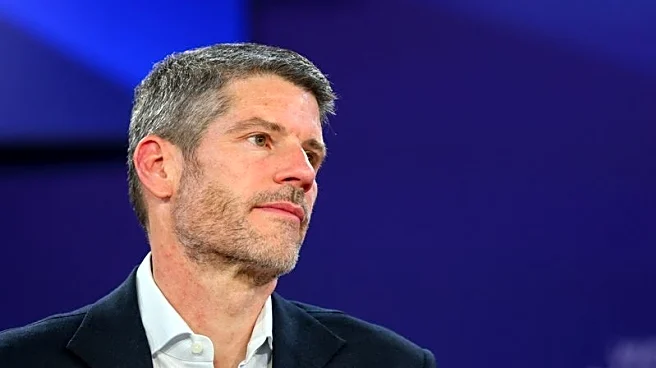What is the story about?
What's Happening?
The film 'Nuremberg,' directed by James Vanderbilt, premiered at the Toronto International Film Festival (TIFF), showcasing the post-World War II trials of Nazi officials, including Hermann Göring. The film, based on the book 'The Nazi and the Psychiatrist' by Jack El-Hai, took 13 years to develop, focusing on the complex characters involved in the trials. The narrative explores the efforts of U.S. Supreme Court Judge Robert H. Jackson to prosecute Nazi leaders, emphasizing the importance of exposing their crimes on a global stage. The film features a strong cast, including Russell Crowe, Rami Malek, and Michael Shannon, who deliver intense performances in pivotal courtroom scenes.
Why It's Important?
The film 'Nuremberg' is significant as it brings historical events to contemporary audiences, highlighting the moral and legal complexities of the Nazi trials. It underscores the importance of justice and accountability in international law, reflecting on the challenges faced by those who sought to prosecute war crimes. The film's portrayal of these events can educate viewers on the historical impact of the trials and the ethical dilemmas involved in seeking justice for atrocities. It also serves as a reminder of the importance of preserving historical memory and understanding the consequences of unchecked power.
What's Next?
Following its premiere at TIFF, 'Nuremberg' is set to continue its rollout during the Oscar season, potentially gaining further recognition and sparking discussions on historical justice and accountability. The film may influence public discourse on the portrayal of historical events in media and the role of cinema in educating audiences about complex moral issues. As the film reaches wider audiences, it may also prompt renewed interest in the historical context of the Nuremberg trials and their relevance to contemporary issues of justice and human rights.
Beyond the Headlines
The film's exploration of the Nuremberg trials delves into deeper ethical questions about the nature of justice and the responsibility of individuals in positions of power. It raises cultural and legal considerations about how societies remember and learn from past atrocities, and the role of storytelling in shaping public understanding of history. The film's depiction of the trials may also contribute to ongoing debates about the effectiveness of international law in preventing future crimes against humanity.















